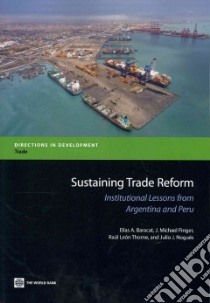Sustaining Trade Reform - 9780821399866
Un libro in lingua di Baracat Elias A. Finger J. Michael Thorne Raul Leon Nogues Julio J. edito da World Bank, 2013
- € 22.90
- Il prezzo è variabile in funzione del cambio della valuta d’origine
Factually, the principal finding of this book is that the trade policy reforms introduced by Peru in the 1990s have continued over several changes of president, whereas similar reforms in Argentina have been reversed. In both countries, the reforms included the introduction of new mechanisms for managing trade policy as well as the reduction of restrictions. Throughout the decade beginning in 2000, Peru’s liberalization expanded. The new institutions became more robust, and through them pressures for protection were effectively contained. At the same time, Argentine trade policy returned to the high-protection import substitution regime in place before the 1990s reforms. Multiple restrictions have been imposed, mostly through a reversion to informal methods that abjure the governance characteristics that the 1990s reforms introduced.The difference between the two cases cannot be explained by economic parameters such as resource endowments or external shocks. Peru’s reforms manifest the buoyant and confident attitude toward the global economy that reform leaders were able to introduce into Peruvian politics. In the words of former president Alan García, there is an eagerness to “climb up on the wave of growth.” In comparison, Argentina’s current development strategy sees international trade as detrimental to Argentina’s interests unless participation by Argentine buyers and sellers is guided by government intervention.The Peruvian case provides examples of successfully managing the politics of reform and the technical aspects of policy so as to establish transparent and participatory processes that weigh accurately the impact of trade policy on all affected domestic parties. The Argentine case demonstrates that the World Trade Organization legal system is not an effective restraint on a government that wants to revert to an import substitution regime. International cooperation has been useful when it has recognized and influenced domestic sovereignty over economic regulation; however, it is not been useful when approached as a matter of international regulation of national actions.
Informazioni bibliografiche
- Titolo del Libro in lingua: Sustaining Trade Reform
- Sottotitolo: Institutional Lessons from Argentina and Peru
- Lingua: English
- Autori : Baracat Elias A. Finger J. Michael Thorne Raul Leon Nogues Julio J.
- Editore: World Bank
- Collana: World Bank (Paperback)
- Data di Pubblicazione: 05 Agosto '13
- Genere: BUSINESS and ECONOMICS
- Pagine: 147
- EAN-13: 9780821399866


